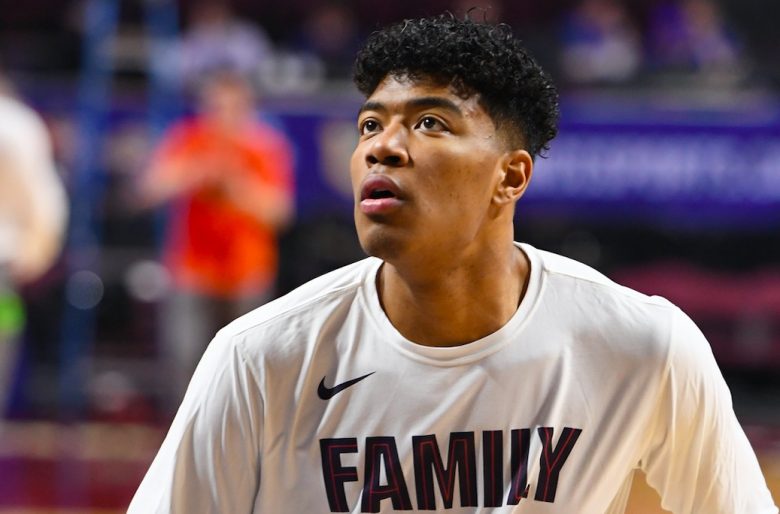
Rui Hachimura’s parents’ names are unknown, but a good bit about his upbringing is known. Hachimura is half Japanese, half Beninese. His mother is from Japan and his father is from Benin, a country in West Africa. Hachimura’s rise to fame as a multi-racial athlete from Japan has been noted by many, especially given how rare that might have been half a century ago within the culture of Japan. Other similar athletes included Naomi Osaka, who is half Japanese, half Haitan.
Hachimura hails from Sendai, Japan, where his family still lives. Though he often speaks highly of his heritage in interviews, he did acknowledge the challenge of being “hafu,” or biracial, in Japan.
To Bleacher Report, he said of his high school years (when his star was already rising on the basketball court), “They looked at me like a f*cking animal or something. It was part of the reason I wanted to come to the U.S. Everybody is different. I thought it would be good for me.”
He added, “People don’t know anything about me here. They just look at me as like another black person. That was so nice. I’m a little bit famous here now, but when I first got here, I really liked it.”
In an interview prior to Gonzaga playing in the Sweet Sixteen, Hachimura also acknowledged the racism that his father has dealt with in Japan. He said, via The Athletic, “I think it was hard for him, but he’s a real friendly guy and can communicate with the people. He didn’t like, you know, feel sorry for himself.’’
Here’s what you need to know:
Why Hachimura’s Parents’ Names Are Protected From Reporters & the Public
Hachimura’s parents name are kept under lock and key, even to reporters who have been following the basketball player for years. In an interview prior to Gonzaga playing in the Sweet Sixteen, Hachimura answered a question about what his father’s name was by saying, via The Athletic, “No, no, no. I don’t tell. I never say. I don’t want any disruption. With the Japanese media, it’s a little crazy. Eventually, they’re going to find out, but right now, I don’t want people to know.”
Hachimura said to The Athletic that he learned how to deal with people in Japan staring at him for being a “hafu” by watching how his father dealt with that similar adversity. He said, “I definitely watched.”
Hachimura Learned to Speak English at Gonzaga
Hachimura knew virtually no English until he came to Gonzaga, and had to learn all of it while he was in college. Per Bleacher Report, his parents know very little English themselves, and Hachimura often tried to learn by listening to rap music, watching movies like The Fast and the Furious, and working with Gonzaga’s coordinators. One of those coordinators, Stefany Galbraith, said to Bleacher Report, “Rui is our most prized international student. He’s our most improved from where he was at when he arrived.”
Mark Few, Gonzaga’s head coach, acknowledged to Bleacher Report that Hachimura’s language struggles were a challenge at first. He said, “He always has a smile on his face, and he always nods,” Few says. “And I always tell the staff, ‘When he gives you that nod, what it means is he has no idea what the hell you’re talking about.’ That’s zero absorption. We operated that first year under about 10 percent absorption. It was very difficult for him to get on the floor. Yet when he was on the floor, you had this marvelous athlete who was running and jumping and playing and was something to watch.”
Few added, “I’m sure every coach always tells you, This is a great kid, but Rui is a great kid. The sacrifices he made to come over here and learn the language and become a player—all the good things that are happening in his life are well-deserved.”
To ESPN, Hachimura said that his first season was the hardest. “You really can’t communicate,” he said. “That was really hard. That was really stressful. I don’t know how I did that. But I don’t think I’d do the same thing again, if I knew it was going to happen like that. No.”
He added, “I think I faked it a lot.”
Ken Nakagawa, a graduate student and video coordinator for Gonzaga, served as Hachimura’s unofficial translator, too. To ESPN, Nakagawa said,
“His first year was crazy. He’d either be on the court at practice, or he’d be in the classroom studying, or he’d be back in the lab studying with his tutor. He really had no breaks. Through all that, he probably missed, maybe, five workouts outside practice all year. From the get-go, he came up to me and told me, ‘I don’t want to speak Japanese. I want all our communication to be in English.’ We rarely speak Japanese together. Even when we grab something to eat or we’re just hanging out, we’re always speaking English.”
Comments
Rui Hachimura’s Nationality, Ethnicity, & Background